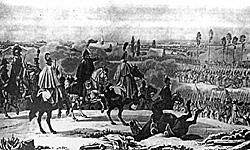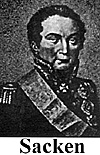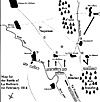The Lost Opportunity
La Rothiere
1 February 1814
by Patrick E. Wilson, UK
| |
To be fair, it ought to be said that the forces available to the Marshals were wholly inadequate for the task they were given and to be honest the majority of them were tired of war and their hearts were just not in it. By the end of the month Blücher was in the vicinity of Brienne, a town renowned for its scholarship and situated near the river Aube, and less then a hundred miles from Paris. Schwarzenberg was within supporting distance and it looked as if the war would should be over to judge by the weak French resistance so far. Napoleon had spent most of January in Paris trying to raise new forces to hold his quickly diminishing dominions, he had even attempted to bring the war in the Peninsula to end so that he could deploy the veteran armies of Marshals Soult and Suchet in Eastern France. This had failed. On the 25th January he left Paris saying to Marshal Berthier; 'Come, we must repeat the campaign of Italy' and urging Marshal Auqereau, commanding the army defending Lyons; '...to pull on his bouts of 1796'
But the numbers against the French Emperor and, perhaps more importantly, the morale of his chief subordinates, which was at an all time low, meant that this appeal was unlikely to have the effect intended, though the ordinary rank and file soldier were as enthusiastic as ever. Indeed, the old men and teenagers that now represented his army would almost realise this wish of repeating the Italian campaign of 1796-97. Nevertheless time was running out for Napoleon as he collected his forces for the first of many battles in 1814. The Allies had the upper-hand in both numbers and resources, and a determination, particularly in the likes of Blücher, to see things through to the bitter end.
Brienne
Brienne is an open place, composed of wooden houses, with a castle or manor house on a nearby hill and surrounded by a open plain which was ideal for cavalry action. At about 2.00pm patrols of French cavalry began to appear, in response Blücher placed Sacken's cavalry in support of Pahlen, who now found himself facing Grouchy's rapidly deploying cavalry. At the same time French artillery batteries start to open fire, the fire of these cannon quickly set houses on fire in Brienne and compelled Pahlen's and Sacken's cavalry to withdraw through Brienne.
The French now attacked Brienne with infantry and drove Olsuview out despite the gallantry of his troops but fortunately for Olsuview Sacken arrived at that moment and counter-attacked the victorious French. Despite nearly getting himself captured, Sacken was able to retake must of Brienne by mid-night, the desperate house to house fighting being lit by the fire that was slowly consuming that town. Casualties were heavy on both sides, the French losing two officers of renown, Admiral Baste killed and General Decouz mortally wounded.
Whilst this nocturnal fight was going on Blücher had observed that Napoleon had amassed his cavalry on his right wing only, transferring his cavalry to the left Blücher launched Pahlen's and Sacken's cavalry in a vigorous attack, that smashed into the French left and routed the infantry division of General Duhesme and took its artillery. Night ended the fighting except in Brienne where Sacken's men and the French fought on. Blücher, despite having repulsed Napoleon's at tack, ordered a silent withdrawal for the 30th January, and covered by Pahlen's and Sacken's cavalry fell back upon the town of Trannes.
Where he took up a defensive position and awaited the arrival of Schwarzenberg and his Army of Bohemia, which he knew to be within a day or two's march. The combat at Brienne had shown that the Allies had the upper hand, with 30,000 men Blücher had held and repulsed Napoleon at the head of his once much vaunted Grande Armée. With Schwarzenberg's support they would surely win the next battle and end the war to the Allies advantage. The next two days however seemed a bit anticlimactic as Napoleon did very little in front of Blücher's outposts, and for this Blücher was probably thankful, as an immediate attack may have driven him into the Aube before Schwarzenberg could adequately support him.
By the 31st however, the Wurttemberg Corps was within supporting distance and Blücher's and Napoleon's forces were probably equal. More importantly by the morrow the main body of Schwarzenberg's army would be up and if all went according to plan, Blücher would attack with support of the Wurttemberger's and an Austrian Corps. The scene was set for a battle that could (and should have) decided the war that had begun in 1812.
Battlefield
The battlefield itself presented a wintry scene, a recent thaw had also rendered the movement of artillery particularly difficult, snow covered fields with villages dotted here and there. The village of Dienville rested on the right bank of the river Aube and controlled an important bridge there, to its left and at a cross-roads lay the village of La Rothiere. Left of La Rothiere lay the villages of La Petit Mesnil and La Giberie, south of these lay the wood of Beaulieu and to the north a village called Chaumesnil. To the north-west of this village lay another called Morvilliers, to the north another wood, the wood of Ajou. Blücher's forces lay to the South of these villages and woods near the town of Trannes. He had at his disposal on the morning of the 1st February 1814, the Russian Corps of Sacken and Olsuview, now a little battered following the action at Brienne, the Wurttemberg Corps and the Austrian 3rd Corps. Altogether approximately 53,000 men and these could be supported by General Barclay de Tolly's reserves of 34,000 men if the need arose.
Blücher could therefore be confident of victory, even in the adverse weather conditions then prevailing. It was snowing heavily and would do so, with the occasional interval, throughout the day. Indeed, the weather was remind both Russian and French veterans of the Battle of Eylau in 1807, a battle that was fought in similar atrocious weather conditions.
The Allies had a plan which it was hoped would result in the destruction of Napoleon's forces, this plan suggested by the Bavarian General Count Wrede involved a frontal assault by the troops under Blücher's command whilst Wrede with his Austro-Bavarian Corps and that of the Russian General Wittgenstein took Napoleon in the flank. The plan was simple and effective but somehow weakened when only Wrede actually attacked Napoleon's flank and Blücher's attack only developed piecemeal.
The first unit of Blücher's command to attack was the Wurttemberg Corps, which led by the Crown Prince of Wurttemberg, advanced through the wood of Beaulieu and assailed the position of Marechal Victor-Perrin around the villages of La Petit Mesnil and La Giberie. This initial attack took the villages with the first rush but Victor-Perrin's veteran troops quickly recovered, counterattacked and regained the villages. What made things even more difficult for the Crown Prince of Wurttemberg was that he had only managed to get one battery of artillery through the wood of Beaulieu to support his infantry. He was also up against a Marechal who was well experienced in holding positions in times of crisis. Victor-Perrin had held the town of Marengo for many hours in the famous battle of that name, he had covered the bridge at the Berezina in similar circumstances and only the year before had held the village of Probsthieda at the great Battle of Leipzig. The Crown Prince of Wurttemberg soon found his advance brought to a standstill.
La Large Map of Battle of La Rothiere (slow: 72K)
Once Sacken had the rest of his artillery up, had arranged his infantry and gothis Hussars and Dragoons up to support him, he attacked La Rothiere furiously. His artillery quickly overpowered the enemy's and set La Rothiere ablaze. His infantry then charged into La Rothiere at bayonet point, fought from house to house and cleared all of the village but a handful of houses at the northern end, which the French under General Duhesme, an old republican warhorse, refused to relinquish.
The French were then reinforced and counter attacked in turn, Sacken's infantry were driven back upon their supports, and Sacken himself was nearly captured in the streets of La Rothiere. Sacken's cavalry did a little better, holding both Grouchy and Nansouty in check on either side of La Rothiere. One moment Sacken's cavalry advanced to charge, the next falling back before a French attack but their moment of fame came when they charged and captured four batteries of horse artillery of the French Imperial Guard.
So far the entire Allied attack had been fought to a standstill by the skill of the French Generals, now however the Bavarian General Wrede made his appearance. Initially delayed by the cavalry of General Pahlen crossing his path, not to mention the weather, Wrede appeared at an appropriate time for the Allies and brought some much needed support. His advanced units quickly drove Marechal Auguste Marmont from Morvilliers and then proceeded to occupy the wood of Ajou, thus threatening Napoleon's flank and rear. However it was at this time also that Wrede received a urgent request from the Crown Prince of Wurttemberg asking for his help in his attack against Victor-Perrin.
Wrede, despite the obvious advantage of continuing his line of attack into Napoleon's rear, responded by launching his columns in a daring bayonet assault upon the village of Chaumesnil and stormed it, evicting Victor-Perrin's troops without much trouble. Chaumesnil however was important to the French, Napoleon ordering Marmont and a division of his Young Guardsmen to retake it. A serious of murderous assaults followed but it seems that the Bavarians maintained their foothold in the village, and aided by some well timed charges by their cavalry may have taken guns in the whirling snow and darkening evening. Nuns the less Marmont managed to hold the Bavarians in that area of the field until darkness fell and with it Wrede's magnificent opportunity to fall on Napoleon's flank and rear and win the battle decisively in favour of the Allies.
Meanwhile elsewhere on the battlefront, the Crown Prince of Wurttemberg, assured of Wrede's support, had again assaulted La Petit Mesnil and La Giberie. The Wurttemberqers again took La Giberie without difficulty, and then, despite an obstinate defence by Victor-Perrin, took La Petit Mesnil but a pursuit by the Wurttembergers was thwarted by, the weather, tiredness of their troops and an unfortunate clash with Bavarian cavalry in the advancing darkness of the day.
At La Rothiere, Sacken had received reinforcements from Barclay de Tolly's reserves and the intrepid Marshal Blücher placed himself at their head and led them straight into the storm that was La Rothiere:
'He led them personally into the fire, with the animation and energy so conspicuous in his actions, when the hour of emergency and danger calls them forth. A Cossack was shot dead, close to him... A dreadful fall of snow hid, at intervals the columns from each other, and the wind drove it in the faces of the troops with such violence, that it was utterly impossible for them, at times, to fire in steady platoons.' (Gniesenau, General Count, The Life and Campaigns of Field Marshal Prince Blücher (Hopewell: On Military Matters, 1996) p.323)
Not only did Blücher's men have to face the whirling snow but also the fire of the French defenders, many of them Young Guardsmen under the orders of Marshal Oudinot. Why Napoleon had ordered to hold La Rothiere at all costs. This Oudinot had dune together with the remnants of Duhesme's men, and their combined forces had held and repulsed all that Sacken could throw at them. However Blücher's fresh assault was decisive and though the French defenders fought like lions, the Russian Grenadiers cleared the village by 8.00pm and Oudinot was forced to assemble the survivors of his and Duhesme's command to the north of the village. The Russian Grenadiers could not get any further though for Napoleon had assembled his Artillery of the Guard under General Antoine Drouot to the north of La Rothiere.
Any pursuit by Blücher's triumphant Russians would be shot to pieces by the emperor's beautiful daughters. And here the battle ended. Napoleon had been driven from his initial position, had lust 6,000 men and many valuable cannon, indeed more than he would have wished, for many from his best formations. The Allies had lust about 5,000 men but had taken a few thousand prisoners and many cannon and could claim victory over Napoleon himself, and were probably confident of a quick end to the war.
However the Allies had missed a marvellous opportunity. Had General Wrede continued along his original line of advance instead of responding to the Crown Prince of Wurttemberg, the final outcome of the battle could have been even more decisive for the Allies. Indeed, Napoleon's army could have been shattered beyond repair and peace may have followed within days, and the battles and casualties of the following weeks would have been avoided. But this is mere speculation, La Rothiere, DID however provide the Allies with a golden opportunity to deliver a knockout blow and it is hard to visualise Napoleon in similar circumstances letting such an opportunity slip.
Though it has to be added that the atrocious weather and the continued awe that Napoleon still inspired were important factors, not to mention the excellent fighting qualities of Marshal Victor-Perrin, Generals Gérard and Duhesme, who held the French line for many hours unaided. Finally there is hidden political agenda of Metternich and others.
Chandler, David G., The Campaigns of Napoleon (London: Weidenfeld and Nicolson, 1987. First published New York: Macmillan, 1966).
|
 On New Years day 1814 Field-Marshal Gebhard von Blücher led his army across the river Rhine into France, Field-Marshal Prince Schwarzenberg followed with his army a few days later. They quickly overran Eastern France, the French Marshals who were supposed to delay them proved unequal to the task. Although Marshal Mortier at the head of his Imperial Guardsmen fought a number of valiant delaying actions against Schwarzenberg and tried his best to delay that general.
On New Years day 1814 Field-Marshal Gebhard von Blücher led his army across the river Rhine into France, Field-Marshal Prince Schwarzenberg followed with his army a few days later. They quickly overran Eastern France, the French Marshals who were supposed to delay them proved unequal to the task. Although Marshal Mortier at the head of his Imperial Guardsmen fought a number of valiant delaying actions against Schwarzenberg and tried his best to delay that general.
 On 29th January Blücher had reached Brienne, he had with him Pahlen's Russian Cavalry Corps and Olsuview's 9th Russian Corps. General Baron Sacken was also within easy supporting distance with a further 20-25,000 men. Brienne was to be Blücher's point of concentration for he had just intercepted a despatch to Marshal Mortier which clearly showed Napoleon's intention to offer battle as soon as possible. Blücher's first reaction was to order General Sacken forward to his support and to deploy General Pahlen to cover that general as he advanced up the Chaussee, whilst Olsuview secured Brienne with his Corps of 5,000 men and 24 guns.
On 29th January Blücher had reached Brienne, he had with him Pahlen's Russian Cavalry Corps and Olsuview's 9th Russian Corps. General Baron Sacken was also within easy supporting distance with a further 20-25,000 men. Brienne was to be Blücher's point of concentration for he had just intercepted a despatch to Marshal Mortier which clearly showed Napoleon's intention to offer battle as soon as possible. Blücher's first reaction was to order General Sacken forward to his support and to deploy General Pahlen to cover that general as he advanced up the Chaussee, whilst Olsuview secured Brienne with his Corps of 5,000 men and 24 guns.
 Meanwhile the Russian General Sacken had advanced upon La Rothiere, the weather and the thaw of the previous day meant that he could only bring half his artillery up and had to send his artillery teams back for the rest. The French General Comte Nansouty tried to exploit this and charged the first half of Sacken's artillery, the gunners however were trained to fight at their guns to the last and stopped Nansouty dead with a hail of grapeshot.
Meanwhile the Russian General Sacken had advanced upon La Rothiere, the weather and the thaw of the previous day meant that he could only bring half his artillery up and had to send his artillery teams back for the rest. The French General Comte Nansouty tried to exploit this and charged the first half of Sacken's artillery, the gunners however were trained to fight at their guns to the last and stopped Nansouty dead with a hail of grapeshot.
 To the left of General Sacken's advance, the Austrians of Count Gyulai's Corps advanced and attacked the village of Dienville and the important bridge there. The French commander in this sector, General Gérard, another experienced veteran, had barricaded the bridge and though his men were conscripts managed to beat off this attack and all other attempts of that day. To be fair to Gyulai, that officer had one of the must difficult tasks of the day and one of his divisions had been detached elsewhere, and consequently he probably didn't have sufficient forces for the task.
To the left of General Sacken's advance, the Austrians of Count Gyulai's Corps advanced and attacked the village of Dienville and the important bridge there. The French commander in this sector, General Gérard, another experienced veteran, had barricaded the bridge and though his men were conscripts managed to beat off this attack and all other attempts of that day. To be fair to Gyulai, that officer had one of the must difficult tasks of the day and one of his divisions had been detached elsewhere, and consequently he probably didn't have sufficient forces for the task.